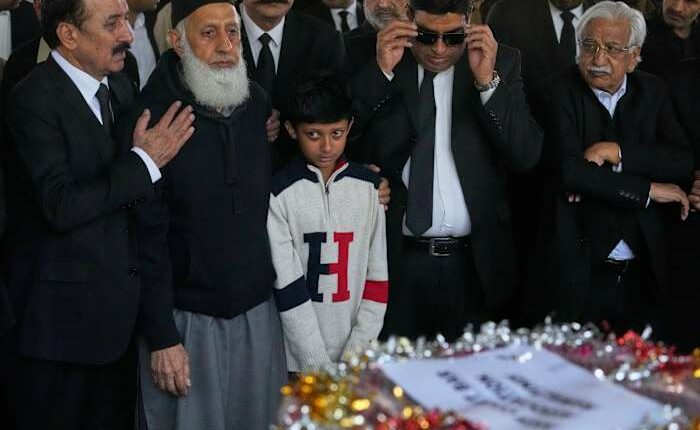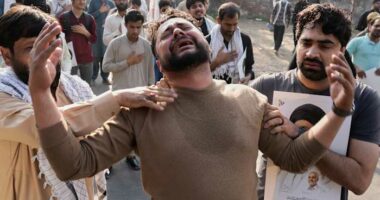Share this @internewscast.com

ISLAMABAD – On Wednesday, Pakistan launched an investigation into a devastating suicide bombing that occurred outside a district court in Islamabad, claiming the lives of 12 individuals the previous day. This tragic event highlights the significant challenges the government faces, including militant violence, border disputes, and a shaky ceasefire with Afghanistan.
The bombing took place at a court situated near a residential area on the outskirts of the city. Despite numerous security operations aimed at dismantling militant networks, the incident alarmingly demonstrates that these groups still possess the capability to execute high-profile attacks in the nation’s capital.
In recent years, authorities have been grappling with an increase in militant activities. However, until this recent attack, Islamabad was largely perceived as a relatively secure location.
On Wednesday, forensic experts and police officers meticulously examined the blast site, which had been cordoned off to protect crucial evidence. Meanwhile, across the city, grieving family members gathered at a local hospital to receive the bodies of the victims.
Funeral prayers commenced for some of those who lost their lives. Fortunately, most of the 27 individuals injured in the bombing were treated and subsequently discharged from the hospital.
The attack has led to further accusations from Pakistan, as the country seeks to address the ongoing threat of militancy.
Interior Minister Mohsin Naqvi alleged in the immediate aftermath of Tuesday’s bombing that the attack was “carried out by Indian-backed elements and Afghan Taliban proxies” linked to the Pakistani Taliban, though he said authorities were “looking into all aspects” of the explosion.
He offered no evidence for his claim.
India and Afghanistan’s Taliban-led government, which both reject Pakistan’s accusations, have been working to increase ties in areas like business and humanitarian aid, despite not having formal diplomatic relations.
Naqvi also blamed the Pakistani Taliban, known as Tehrik-e-Taliban Pakistan or TTP, for the attack. Pakistan has long claimed that the Afghan Taliban have been sheltering TTP leaders and fighters, a claim Kabul denies.
The TTP denied involvement while a breakaway faction, Jamaat-ul-Ahrar, claimed responsibility only to have one of its commanders later on Tuesday contradict that claim.
Jamaat-ul-Ahrar split from the TTP after its leader was killed in Afghanistan in 2022; some members have since rejoined the TTP while others remain independent, underscoring deep divisions within Pakistan’s militant networks.
The Islamabad attack drew widespread condemnation from the international community.
Attack on a military-run college
On Monday night, four militants targeted an army-run college for cadets in the northwestern city of Wana. The police said four of the attackers — including a suicide car bomber — were killed and more than 600 people, including 525 cadets, their teachers and other staff, were safely rescued during the overnight assault.
The attack unfolded when a suicide bomber rammed an explosives-laden vehicle into the college gate. Troops quickly fanned out across the campus to prevent the attackers from reaching the buildings where cadets and staff had taken shelter.
Footage aired on Pakistani news channels Wednesday showed soldiers evacuating students using wooden ladders and breaking windows to get inside the dormitories. The evacuees were later transported to safety in armored vehicles, officials said.
No one claimed responsibility for the attack.
Information Minister Attaullah Tarar said the attackers appeared to be attempting a repeat of the 2014 Peshawar school massacre — the deadliest assault on a school in the country — when a breakaway TTP faction killed 154 people, mostly children, at an army-run school in Peshawar.
Escalation with Afghanistan
Tensions between Pakistan and Afghanistan have risen since last month, when Kabul accused Islamabad of carrying out drone strikes on Oct. 9 that killed several people in the Afghan capital.
The strikes sparked cross-border clashes that left dozens of soldiers, civilians, and militants dead before Qatar brokered a cease-fire on Oct. 19. Two rounds of follow-up peace talks in Istanbul ended without progress after Kabul refused to provide written assurances that militants would not use Afghan soil to stage attacks in Pakistan.
The TTP, which is allied with but separate from the Afghan Taliban, has been emboldened since the Taliban 2021 takeover of Afghanistan.
As Pakistan’s tensions with both India and Afghanistan remain high, New Delhi and Kabul have upgraded ties.
India’s Foreign Secretary Vikram Misri and acting Afghan Foreign Minister Mawlawi Amir Khan Muttaqi, who obtained a temporary exemption from travel ban under U.N. sanctions, met in New Delhi in September. And last month, India said its technical mission in Kabul would become a full embassy — the first high-level diplomatic engagement since the Taliban took power.
___
Associated Press writers Ishtiaq Mahsud in Dera Ismail Khan, Pakistan, and Riaz Khan and Rasool Dawar in Peshawar, Pakistan, contributed to this story
Copyright 2025 The Associated Press. All rights reserved. This material may not be published, broadcast, rewritten or redistributed without permission.










